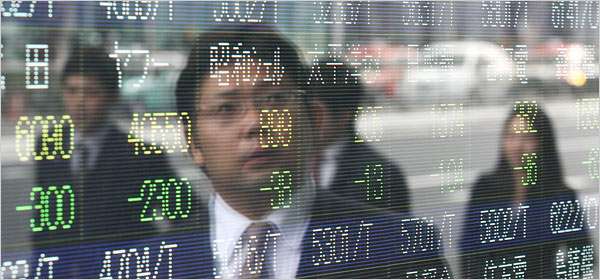 Asian Stocks Rise After Yen Drop, Iran Nuclear Agreement
Asian Stocks Rise After Yen Drop, Iran Nuclear Agreement
Asian stocks rose, with the regional benchmark index rebounding from last week’s drop, as the yen weakened, Iran agreed to limit its nuclear program and investors bet improving U.S. economic data will boost earnings.
Nikon Corp. (7731) advanced 2.8 percent as the yen touched the weakest level in almost six months against the dollar, boosting the earnings outlook for Japanese exporters. Warrnambool Cheese & Butter Factory Co. climbed 2.2 percent in Sydney after Saputo Inc. raised its offer for the company. Beadell Resources Ltd. slumped 6 percent, leading Australian gold miners lower as the price of the precious metal retreated after Iran agreed to limit its nuclear program in exchange for as much as $7 billion of relief from economic sanctions
The MSCI Asia Pacific Index gained 0.4 percent to 141.78 as of 11:44 a.m. in Hong Kong, with nine of the 10 industry groups on the gauge rising. The measure slid 0.2 percent last week for the fourth such loss in five weeks. Still, the index climbed 9.2 percent this year through Nov. 22 as investors bet the Federal Reserve won’t taper its monthly bond buying before 2014.
Investors “see the economy and corporate earnings growing at an improved rate with ongoing valuation support from continued low interest rates,” Ric Spooner, Sydney-based chief market analyst at stockbroker CMC Markets, said in an e-mail. “That’s unlikely to be disturbed by the Fed’s taper program.”
Regional Gauges
Japan’s Topix index gained 0.5 percent and the Nikkei 225 Stock Average rose 1.1 percent as the yen fell 0.4 percent to 101.66 per dollar. Japan Pile Corp. sank 12 percent to 971 yen after the construction firm said it will raise as much as 5.15 billion yen ($50.9 million) in a share sale.
Hong Kong’s Hang Seng Index and China’s Shanghai Composite Index both rose 0.2 percent. Australia’s S&P/ASX 200 Index climbed 0.5 percent and New Zealand’s NZX 50 Index was little changed. South Korea’s Kospi (KOSPI) index added 0.9 percent. Singapore’s Straits Times Index gained 0.3 percent and Taiwan’s Taiex Index increased 1.1 percent.
The MSCI Asia Pacific Index traded at 13.9 times estimated earnings on Nov. 22, which is 14 percent below its average of 16.2 during the past 10 years, according to data compiled by Bloomberg. The current valuation compares with 16.3 on the Standard & Poor’s 500 Index and 15.1 for the Stoxx Europe 600 Index.
Earnings on the Asia Pacific measure will grow 12 percent next year and 10 percent in 2015, according to analyst estimates compiled by Bloomberg.
U.S. home sales data today is forecast to show an increase in October from the previous month, adding to reports last week that showed weekly jobless claims fell to the lowest level since September and American consumers became less pessimistic this month.
Fed Stimulus
Minutes of the Fed’s October meeting released Nov. 20 showed officials may reduce their $85 billion a month of bond buying if the economy improves as anticipated. Stimulus from the Fed has helped the S&P 500 soar 167 percent since its March 2009 low. The index has advanced 27 percent this year, poised for its best annual performance in a decade.
By agreeing to curtail its nuclear activities, Iran won an easing of certain sanctions on oil, auto parts, gold and precious metals for six months. The deal, which is reversible, was announced yesterday after five days of talks in Geneva. Gold lost 0.3 percent to $1,240.08 an ounce.
The Iranian accord is the first major crack in the deadlock over Iran’s nuclear program since 2003, when Hassan Rouhani, now the president of the Islamic republic, was its top negotiator. Since then, the dispute over the purpose of the program has helped deepen sectarian rifts in the Middle East, sparked threats of military action by the U.S. and Israel, and raised concerns that the oil-rich region was heading for a nuclear-arms race.
Political Risk
The Iran deal “may provide a more supportive backdrop across the board in terms of there being less political risk, but it’s not going to be the key focus of the week,” Chris Green, a strategist in Auckland at First NZ Capital Ltd., said by telephone.
Bank of Japan Governor Haruhiko Kuroda, who speaks in Tokyo today, helped drive a 45 percent surge in Japan’s Topix index this year. Kuroda maintained the central bank’s monetary easing as he and Prime Minister Shinzo Abe sought to jolt the nation out of 15 years of deflation. The Topix is the best performing index of 24 developed markets tracked by Bloomberg.
Futures on the S&P 500 (SPX) today advanced 0.3 percent today, after last week closing at a record high and capping a seventh week of gains. The Dow Jones Industrial Average, also rose for a seventh week, its longest streak of such gains since January 2011.










Add comment